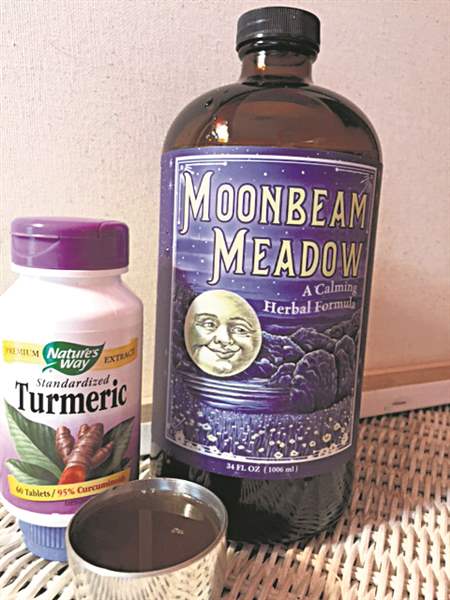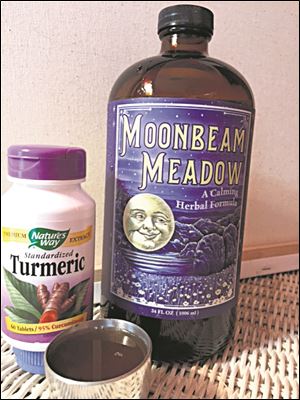
COMMENTARY
A tart toast to good health
2/11/2018
Turmeric capsules and vinegar with herbs are hopeful dietary remedies.
THE BLADE/MARY ALICE POWELL
Buy This Image
Are we following trends, jumping on the bandwagon, or just hoping that the latest dietary fad will make us healthier, live longer, and restore youth?
Why not say yes to all of the above, even though they are improbable dreams?
Each night when I chug down a shot of vinegar and take a turmeric capsule, I think these products shouldn’t do any harm to the old body, and, just maybe, some of the accolades said about them may be true.

Turmeric capsules and vinegar with herbs are hopeful dietary remedies.
If nothing else, they make good chit chat at the beauty shop or when you are out with the girls for lunch and are tired of talking about the weather and the grandchildren.
Cider vinegar is a commonly used product in cooking. It adds just the right touch to hot dishes like barbecue sauce and is a must when making cabbage slaw and canning pickles. Back home, the vinegar cruet was always on the table when cooked spinach was the vegetable at supper.
But, drinking it straight is, as they say, an acquired taste.
As for turmeric, that I take daily in capsule form, following my doctor’s directions. It too is identified as a product used in cooking, but it also is considered a healing spice. India is the major exporter of both dried and ground turmeric. It is used in Indian curries and also in Caribbean and African cooking, more because of its bright yellow color than for the mild flavor.
A box of turmeric tea is now also in the larder. Steeped in boiling water for a couple of minutes, the tea is mustard-colored and has more flavor than many teas on the market. It is labeled as a detoxify tea. There are recipes to make turmeric tea from the ground product in the spice rack, but the tea bags are more convenient.
Although turmeric is claimed to have been used in Asia as medicine and in food for 4,000 years, it has more recently become the darling of nutrition researchers in the western world. Curcumin, the compound that gives turmeric its yellow color, is the valuable ingredient that researchers credit for treating inflammation and other maladies in laboratory tests.
If you believe what you read about the yellow spice called “superspice,” you learn that in addition to helping inflammation, the list of things it may treat includes diabetes, cancer, and maybe even Alzheimer’s.

Powell
Curcumin-rich turmeric is mild enough to use randomly in cooking. Suggestions are that it can be sprinkled in pasta, potato dishes, fish, chicken, meatballs, soups, stews, and chili.
Turmeric capsules and tea are part of the new wave of dietary hopefuls to make us feel, walk, and look like new again, but drinking cider vinegar seems to be as old as when it was first discovered as fermented apple juice. Its health values, from weight loss and stress relief to aiding digestion, have been passed down through generations.
Florence, who lived in the little green bungalow before me, drank a tablespoon of vinegar every morning and always said that it wasn’t her favorite flavor but it was good for her. Who could argue that point with Florence? She was almost 99 when she died.
A more recent plus for vinegar came unexpectedly at the Grand Rapids post office.
When I went to claim the package of vinegar ordered from the Vermont Country Store, I told the clerk what was in the package. She was not at all surprised but quickly responded that she drinks vinegar every day to boost her immune system.
Today’s consumers have a wide range of flavored vinegar choices, but the one that is recommended for dietary use is just plain old-fashioned cider vinegar.
Henry Heinz was America’s vinegar king who first made vinegar in 1869 to preserve the pickles that he sold. Before long, he saw a need for vinegar to be marketed in individual bottles, and today Heinz produces 7.5 million gallons of vinegar.
No doubt Mr. Heinz didn’t look beyond the pickling aspect for his product to the myriad of uses ingenious consumers have found for it. Eliminating belly fat is one vinegar use that piques our interest. Other uses that are claimed in the Vinegar Anniversary Book, are concoctions for arthritis pain, making hiccups disappear, burn treatment, and headache relief.
I keep both cider and white vinegars on hand; the cider is for cooking and the white for cleaning. But for the evening cocktail that toasts better health and longevity, I wanted to be more adventurous.
I gave bottles of Moonbeam Meadow, a vinegar product advertised in the Vermont Country Store catalogue as a calming herbal formula, to three stressed friends at Christmas. Two months later when they had not commented on the vinegar and still seemed stressed, curiosity prompted me to order a bottle for myself.
The 34-ounce bottle is $24.95, pretty pricey compared to standard kitchen vinegar, but drinking it from a lovely pewter shot cup gives it a ceremonial touch, and it does have an intriguing flavor.
Vinegar is the first ingredient listed on Moonbeam Meadow, an indication that it is the most prominent one that is used in the Vermont formula. The harsh, bitter vinegar taste is blanketed by several other ingredients, including fruit juices that provide a delicate sweetness.
The ingredients, as listed, are apple cider vinegar, apple juice, grape juice, cinnamon, cloves, echinacea, chamomile, lavender, peppermint leaf, ashwagandha, valerian, hops, turmeric, chickweed, lemon balm, and skullcap.
I enjoy the flavor of the herbed vinegar, but when it’s gone I intend to uncap a bottle of Heinz old-fashioned apple cider vinegar and maybe jazz it up. It should be easy to doctor plain vinegar with fruit juices and some of the other familiar ingredients listed in the herbed product, including cinnamon and cloves, if I prefer not to drink it straight.
But ashwagandha and valerian are not in my spice rack.
Mary Alice Powell is a retired Blade food editor. Contact her at poseypowell@aol.com.